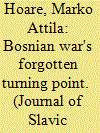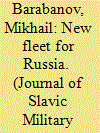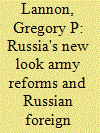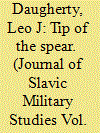| Srl | Item |
| 1 |
ID:
102840


|
|
|
|
|
| Publication |
2011.
|
| Summary/Abstract |
The war in Bosnia-Hercegovina of 1992-1995 altered the course of world politics and had a major impact upon the global consciousness. Yet one of the decisive episodes of this war has been almost wholly ignored in the existing literature: the Bihacacute crisis of autumn 1994. This essay analyzes the role of this crisis in determining the course both of international, particularly US diplomacy, and of the war on the ground. The paradoxical results of the US-led international intervention in Bosnia-of NATO military power being used to coerce the Bosnian Serb rebels to accept a settlement highly favorable to them, in which Bosnia-Hercegovina was simultaneously both reunified and partitioned-may be traced back to this forgotten crisis.
|
|
|
|
|
|
|
|
|
|
|
|
|
|
|
|
| 2 |
ID:
102838


|
|
|
|
|
| Publication |
2011.
|
| Summary/Abstract |
This article examines the sweeping military reforms of Russian Defense Minister Anatolii Serdyukov and the future outlook for the Russian Armed Forces. Anatolii Serdyukov has had a meteoric rise from obscurity. His background in business and career in the Federal Tax Service made his appointment as Defense Minister extremely unlikely and many commentators speculated that his tenure would be short. Serdyukov has been proving his detractors wrong and is rapidly transforming the Russian Armed Forces, by many accounts enacting the most radical reforms in 100 years.
|
|
|
|
|
|
|
|
|
|
|
|
|
|
|
|
| 3 |
ID:
102841


|
|
|
| 4 |
ID:
102839


|
|
|
|
|
| Publication |
2011.
|
| Summary/Abstract |
This article describes how and why the Russian Federation is now re-examining the doctrinal basis and structure of its Navy in the 21st century by assessing potential threats and defining the defensive requirements the Russian Federation must address to ensure national security in the future.
|
|
|
|
|
|
|
|
|
|
|
|
|
|
|
|
| 5 |
ID:
102834


|
|
|
|
|
| Publication |
2011.
|
| Summary/Abstract |
Ratification of the New START agreement by the United States and Russia opens the door to further progress as between Moscow and Washington on strategic nuclear arms reductions. As well, fulfillment of New START requirements and post-New START agreements will add credibility to Russian and American claims for international leadership on nuclear nonproliferation. New START also helps to clear the way for progress on the larger Obama denuclearization agenda, including ratification of the Comprehensive Test Ban Treaty and an international agreement to regulate production of fissile materials. However, nothing is guaranteed in politics, including arms control politics, and New START could backslide on account of U.S.-Russian disagreements over missile defenses, NATO enlargement or other issues.
|
|
|
|
|
|
|
|
|
|
|
|
|
|
|
|
| 6 |
ID:
102836


|
|
|
|
|
| Publication |
2011.
|
| Summary/Abstract |
In December 2009 the first stage of an ambitious military reform of the Russian Federation's army was implemented: the former Soviet, and post-Soviet, four-tiered command structure: military district-army-division-regiment, was replaced with a three tiered command structure: military district-army-brigade. In this process, the brigade replaced the division as the primary tactical unit in the Russian army, and most "cadre-strength" units, partially manned divisions which would be brought up to full strength with reservists in wartime, were eliminated as well. These reforms effectively put an end to the mass-mobilization army that formed the basis of the Tsarist Army and its Soviet and Russian successors since 1874. These reforms are obviously of enormous military importance, but they may also provide insight into how Russia's elites perceive external and internal threats to the Russian Federation, and how Russia currently fits into the contemporary world community. In this light, these reforms may provide support for Russian adoption of a more regionally based-and less global-foreign policy, one that is focused more on what Russian diplomats refer to as "Southern" threats than either possible threats from the North Atlantic Treaty Organization to the West or the Peoples Republic of China to the East.
|
|
|
|
|
|
|
|
|
|
|
|
|
|
|
|
| 7 |
ID:
102842


|
|
|
|
|
| Publication |
2011.
|
| Summary/Abstract |
Starting with the election of Germany's first postwar government in 1949, the Western Allies, most notably the United States and Great Britain, came to the conclusion that in order to strengthen the defenses of Western Europe against a possible Soviet invasion, a viable German Army, free of the militarism and influence from its World War II predecessor, would be necessary for the defense of not only Germany but of Western Europe itself. After surmounting serious French objections to the creation of standing German Army on its border, the government of Chancellor Konrad Adenauer set about to create a West German Army or "Bundeswehr" based on democratic principles and practices. This article, the first of four on the post-World War II German Armed Forces, is a history of the problems, organization, and fielding of what became the "tip" of NATO's sharp spear guarding against the Soviet Army from overrunning Western Europe - the West German Bundeswehr.
|
|
|
|
|
|
|
|
|
|
|
|
|
|
|
|